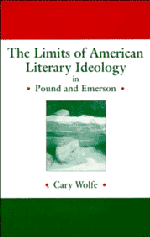5 - Visionary Capital: Contradictions of Pound's Lyric Ideal
Published online by Cambridge University Press: 08 February 2010
Summary
Looking over the Centennial Edition of Francis Palgrave's Golden Treasury, one is forced to say that the lyric ideal Palgrave helped make a literary fixture never dies, it just begets more anthologies. In his 1861 preface, Palgrave had promised that his collection would provide “treasures ‘more golden than gold’” – hence his title, but hence, too, its radical duplicity. This best-selling literary powerhouse, as it turns out, managed to have the best of both worlds: the “gold” one of monetary and financial reward and the “golden” one of lyric transcendence. A hundred years later, in his preface to the expanded, mass-circulation Centennial Edition, Oscar Williams noted in homage that the original Treasury had been a bit tarnished (through no fault of its own) by its “incompleteness made apparent by the passage of time” and by “changes of custom and attitude [which] have been as decided as changes brought about by invention and the upheavals of history.” The Treasury, it seems, needed replenishing, and Williams obliged with an additional three hundred pages of material from Donne to Dylan Thomas. But updating Palgrave also meant adhering to his original aesthetic principles, and it therefore meant undating the new material by the later Victorians and moderns so that they too might assume their place in the golden world of lyric transcendence. And (how quickly they forget) it also meant no space for genteel figures like Van Dyke, Gilder, and Stedman – a bitter historical irony because Williams's declared standards, in solidarity with Palgrave, share more than a little with these American precursors now wiped from the face of literary history by the generation of Pound, Eliot, Frost, and Stevens.
- Type
- Chapter
- Information
- The Limits of American Literary Ideology in Pound and Emerson , pp. 127 - 152Publisher: Cambridge University PressPrint publication year: 1994



